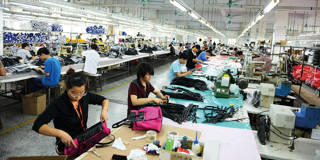The “depoliticization” of economic discourse is a political project aimed at foreclosing any viable alternative to capitalism. To empower workers and resist today’s exploitative capital order, we must revive the lost tradition of classical political economy.
NEW YORK – When seeking empathy for their financial woes, most people know better than to talk to an economist. To understand how the field gained a reputation for not caring about social-justice issues requires tracing the origins of the intellectual paradigm that dominates academia economics and public policy today.
In 1921, Maffeo Pantaleoni, widely recognized as one of the architects of today’s mainstream economic framework and a close collaborator of Italian economist and sociologist Vilfredo Pareto, expressed his disdain for the working class. “It is disgusting,” he wrote, “to witness the masses of workers that are drunk in all our cities.” The “notable increase of wages,” he observed, “was not accompanied by greater civilization so that the worker and his spouse live like pigs (porci) in their homes in order to waste the greatest part of their income in wine at the tavern.”
Horrified at the thought of workers gaining economic rights, Pantaleoni felt an urgent need to help fix what he perceived as a world descending into chaos. World War I had led many European citizens to demand a complete overhaul of their capitalist economies. They sought to replace exploitative structures with emancipated work and prioritize public service and production for use over profit-driven output. During Italy’s so-called Red Years (1919-20), citizens challenged established social hierarchies in unprecedented ways. Peasants collectively managed agriculture through assemblies and cooperatives, while workers took over factories and managed production through councils. These gatherings were widely viewed as the institutional basis for economic democracy.

NEW YORK – When seeking empathy for their financial woes, most people know better than to talk to an economist. To understand how the field gained a reputation for not caring about social-justice issues requires tracing the origins of the intellectual paradigm that dominates academia economics and public policy today.
In 1921, Maffeo Pantaleoni, widely recognized as one of the architects of today’s mainstream economic framework and a close collaborator of Italian economist and sociologist Vilfredo Pareto, expressed his disdain for the working class. “It is disgusting,” he wrote, “to witness the masses of workers that are drunk in all our cities.” The “notable increase of wages,” he observed, “was not accompanied by greater civilization so that the worker and his spouse live like pigs (porci) in their homes in order to waste the greatest part of their income in wine at the tavern.”
Horrified at the thought of workers gaining economic rights, Pantaleoni felt an urgent need to help fix what he perceived as a world descending into chaos. World War I had led many European citizens to demand a complete overhaul of their capitalist economies. They sought to replace exploitative structures with emancipated work and prioritize public service and production for use over profit-driven output. During Italy’s so-called Red Years (1919-20), citizens challenged established social hierarchies in unprecedented ways. Peasants collectively managed agriculture through assemblies and cooperatives, while workers took over factories and managed production through councils. These gatherings were widely viewed as the institutional basis for economic democracy.